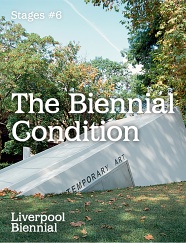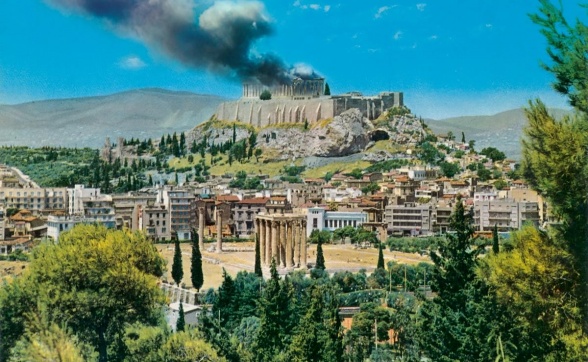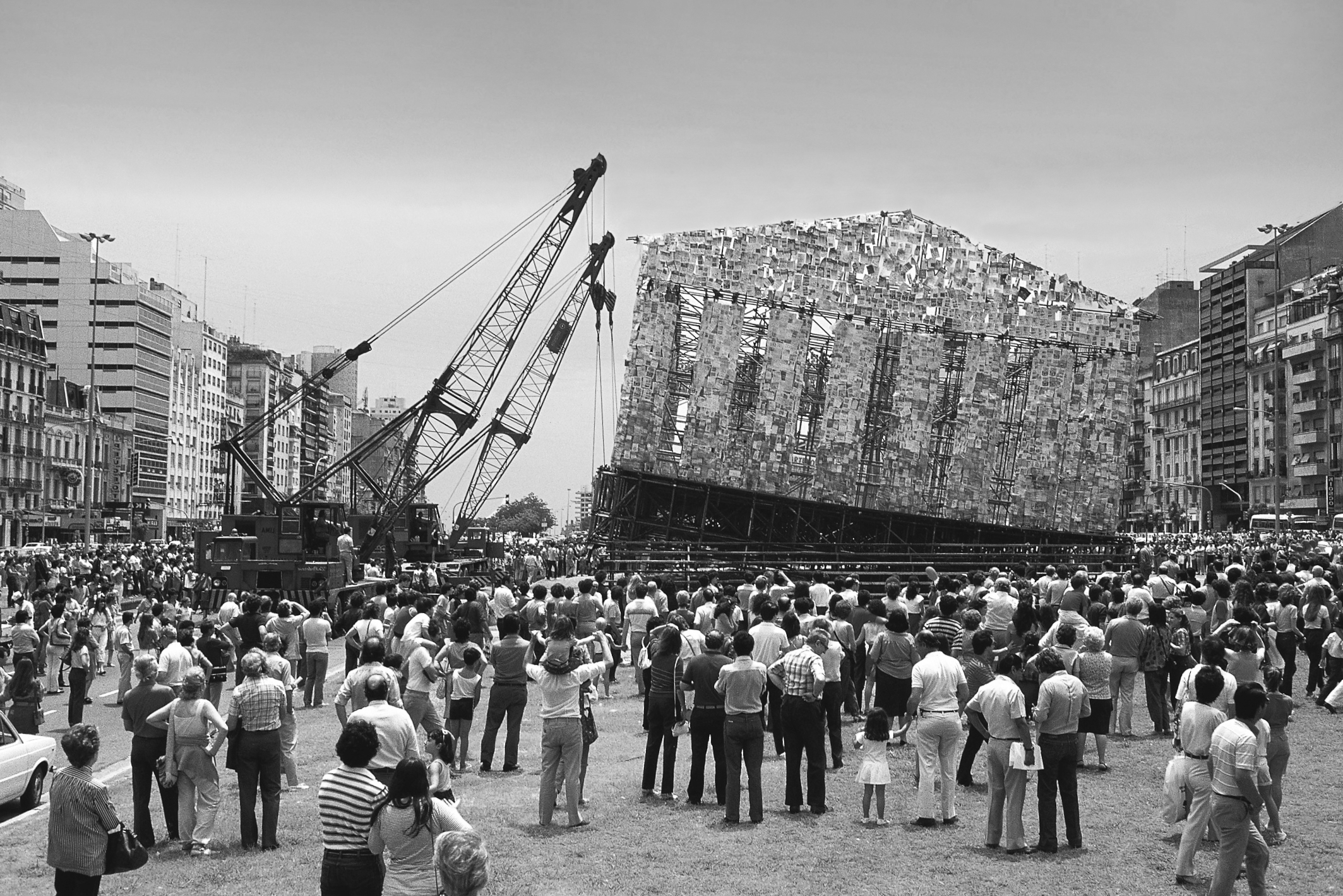
Learning From Athens - a working title and a working process for documenta 14 in Athens and Kassel
Marina Fokidis

Yannis Karlopoulos, News from the Past Series, Athens: Acropolis view with Smoke, 2013. Collage, vintage postcards (First pubished in South as A state of Mind issue 5).
Yannis Karlopoulos, News from the Past Series, Athens: Acropolis view with Smoke, 2013. Collage, vintage postcards (First pubished in South as A state of Mind issue 5).
- extracts from the transcript of the conference talk
[…] The word ‘episodic’ has been repeated many times in relation to Liverpool Biennial. In Greek, it doesn't have the same definition as it has in English: it’s an adjective meaning eventful, adventurous, memorable. So one can say: ‘This was an episodic marriage, an episodic day.’ There are many gaps like this in translations, and they occur very often with the Greek language, but in this case, there’s a happy coincidence. What often happens with biennials is a restriction within time and space – the duration and location of the exhibition – which creates and projects this eventful or adventurous attraction. And perhaps this kind of temporal restriction, which has recently been readdressed, and which some organisers of biennials are attempting to eliminate, is exactly what creates the kind of hype that’s needed by the art market, or even the biennial market – but that leads to a kind of biennalisation or/and the biennial condition. And I’m not excluding anyone from this. As art professionals, we’re all part of this market of biennials.
There are a few other words that I’d like to introduce here that come to mind in relation to documenta 14 in Athens and Kassel, and in relation to any kind of episodic visual experience. ‘Cultural appropriation’, which can be also understood as ‘cultural misappropriation’ is one of the first notions that comes to mind. And to think in terms of this is to ask, who has the right to speak for whom? I come from a topography, a country, a city, a neighborhood even, that’s considered to be the cradle of Western civilisation. As much as this is believed to be a truth, it’s also an assumption. It’s similar to the classicists’ idea of the pure white of the Greek statues and temples – which was a construct, since everything was painted in vivid colours: fuchsia, gold, cyan, red, terracotta. Even the columns of the Parthenon were painted with stripes – as has been proved by chemical testing. The assumption of whiteness, which came much later from Western hegemonic culture, was a kind of a cleansing process, eradicating paganism, multi-theism, multivalent expression, a successful effort to create a pure past, stripped not only of its shadows but also of its variety of aesthetics. The ‘white cube’ follows this idea of the purity of so-called mythical Ancient Greece.
To me, to take this even further, this echoes the way in which capitalism is trying to de-realise life, attempting to create a common and predictable future for all of us. This is perhaps what we mean when we speak about the homogenised global village: what else can it be but a controllable future for everybody around the world? Multinational companies and their goods via malls that look the same everywhere and make every location and the social processes that take place within them the same, is the prevailing scenario – or better, the prevailing reality. Even if some call this accessibility or democracy, don’t forget that democracy is a political situation that was based on slavery. Today’s slaves may be the slaves to consumption. The question is where the profits of this world consumption go. And how does this shape our future needs, our projections for the future, which seem to be becoming more and more identical for all – no matter where we are.
This de-realisation of the future as a process of capitalism – let’s call it radical capitalism because it’s happening all over the planet – is a situation where the roles of the victim and victimiser are interchanging, and this creates great uncertainty. A very interesting proposition for the abolition of capitalism was put forward by writer and law theorist Oscar Guardiola Rivera in his book Being Against the World: Rebellion and Constitution. In a chapter called ‘Rip it up, and start again’ he writes: ‘What matters is to recognize that the de-realisation of time, objects and social world is the operation that allows capitalism to establish the financial value of things.’ In my opinion, these are the terms on which a biennial, or any kind of big artistic agency, is operating on the real.

Marta Minujin, El Parthenon de libros (Parthenon of Books), 1983. Installation, Avenida 9 de Julio, Buenos Aires. Photo: Marta Minujin Archive.
[…] In front of you is an image of the Parthenon being burned. And here you see an image of another Parthenon, which is being built in Kassel for documenta 14. This Parthenon of Books is conceived by artist Martha Minujín, and it’s built from books that have been banned in different political situations in various countries and periods. It will take 100,000 books to build it, donated by individuals and publishing houses. At the end of the process, they will be taken by visitors, who will be allowed to go and dismantle the work. This Parthenon made from banned books is built in the same square where, in 1942, the Nazis burned all the books that belonged to the people living in Kassel during World War II.
[…] I’d also like to show you, through images, our first act in Athens. Documenta 14 established its office in Athens in 2014, when the artistic team moved there, and its public programmes began in 2016, a year before the exhibition itself. Catherine David tried to do the same thing for documenta 10, but it wasn’t yet time – it was a very avant-garde idea, so she wasn’t allowed to do it. Then, for documenta 11, Okwui Enwezor created platforms on every continent long before the Kassel event, whose content was then brought back for the biennial itself. For documenta 13, Carolyn Christov-Bakargiev staged a small episode (if I can borrow the word) in Kabul, unfortunately in a place that only a few international visitors could access, but it had a very a great local impact. Documenta 14 is one documenta in two acts: it will open in Athens in April and then it will reopen in Kassel in June. The two acts will coincide for one month. The same artists will show in both locations, so it’s a kind of a mirroring. But what can a mirroring between Greece and Germany, between Athens and Kassel, be? That’s a question to keep in mind.
As we speak, we’ve started our public programmes, which are operating under the title and framework ‘The Parliament of Bodies’, as conceived by Paul Preciado. They’re hosted in a public building that used to be the headquarters and torture chambers of the military junta in Greece (1967–74) and then became a white-cubic municipal exhibitions centre – another process of erasing or whitening the past. Our public programme space has been re-formed by architect and artist Andreas Angelidakis – who also worked with you at the Liverpool Biennial and with whom I’ve been collaborating since 2004 on several exhibitions including the Thessaloniki Biennial. For the space in Athens, Angelikdakis has created a modular seating device, resampling and based on his previous research on soft ruins. The park that hosts the buildings is called Parko Elefthrias (Freedom Park), which inspired Preciado’s first events: ‘34 four exercises of freedom’. This was one of our ways of attempting to spread documenta 14 organically out into the city and to get acquainted with some of our audiences.
[…] The next word you see on the screen is ‘methexis’, a word that derives from Greek philosophy, and has been used in the context of Greek Tragedy, where it means that the audience can participate in the plot and thus improvise the ending or other parts of the drama. Applied to a biennial, this might imply the human encounter, exchange, and a question would be, how do you allow the audience to change the plot? In ancient tragedy, the audience could speak up if they didn’t agree with the way in which the plot was going, and they could change it, because the theatre was a forum for discussing politics, just as a biennial or other cultural spectacles could be.
In Greek theatre, they also had this clever device called ‘deux ex machina’ (which translates as ‘God from the Machine’). It was a machine that appeared from above when events on stage came to a kind of an impasse politically. This machine would arrive from nowhere and like a giant hand, somehow put everything in order. It wasn’t believed to be a sacred god, but seen as a kind of abstract and undefined solution that signified the results of multiple efforts and multiple queries – even unexpected ones that came from the audience – to the problems at hand.
[…] Nothing can be completed, assumed, learned without the participation of the visitors, whom we like to think of as part of our team in this endless process of learning. We’ve often been asked what documenta 14 is learning in Greece, where the reality is harsh and uncertainty is testing the limits of its citizens’ capacity. I find this a rather silly question. Tangible answers will only serve the capitalistic way of understanding the world: as one globalised future. For us, learning is a working process that forms multiple questions rather than concrete answers; a creative and necessary confusion. The maze shouldn’t be the problem. Closed doors and absolute points of view or absolute solutions are the problem. And this is one of the things that one can learn while in Greece: concrete solutions proposed by bodies of economic experts cannot help the financial situation and the existential and social crisis that it entails. A certain kind of shifting into the questions asked and the pursuit for answers might be more helpful.

Fridericianum, Kassel. Photo: Mathias Volzke.
[…] The idea of our artistic director Adam Szymczyk to share documenta 14 between two locations, Athens and Kassel, to my mind prompts a necessary creative confusion that might have quite a positive political impact on the idea of the exchange between multiple realities and cultures. In Athens and Kassel, the two cities that are receiving artists from all over the world and are sharing the organisation, the implementation, and later, the presentation of the work, documenta 14 has triggered the ‘locals’ of each city to think actively about issues of identity and relationships between economy and power structure rather than in terms of nation. Questions surrounding the local and the global, the ‘cosmopolitan local’ and the ‘cosmopolitan global’, the various conflicting and yet shared pasts and origins, are questions that, within the context of mega exhibitions and biennials as agencies, will hopefully remain unresolved, constantly fluid and modifiable.
Download this article as PDF
Marina Fokidis
Marina Fokidis is a curator and writer based in Athens, Greece. She is currently Head of the Artistic Office, Athens, for Documenta 14. She is the founding and artistic director of Kunsthalle Athena, the first art institution of its kind in Athens, which has presented several exhibitions, workshops, performances and talks between 2010 and 2014. Since January 2012, Fokidis has been the founding director of South As a State of Mind, a bi-annual art and culture publication. She was one of the curators of the 3rd Thessaloniki Biennial (2011), commissioner and curator of the Greek Pavilion at the 51st Venice Biennale (2003), and one of the curators of the 1st Tirana Biennial (2001). Since 2013 she is an adjunct curator in the Schwarz foundation3 – Art Space Pythagorion where she has curated solo shows by Slavs and Tatars (2013) and Nevin Aladag (2014). Fokidis has curated several exhibitions in Greece and internationally, including: Juergen Teller: Macho, a solo show of self-portraits in Deste Foundation (2014); Open Form, a group show of international artists in the Greek art fair, Art – Athina (2013); Midsummer Night’s Dream, a three-month screening programme, as part of Remap 2, a parallel programme to Athens Biennial (2009).
- Introduction: The Biennial Condition
Joasia Krysa - - Chris, Where Have You Been? - I Don't Know!!!
Francesco Manacorda, Raimundas Malasauskas - Biennial Experiences - From Participating To Curating
Elmgreen & Dragset - Biennial Topology
Juliana Engberg - Inside Seven Hills - Kampala Art Biennial 2016
Elise Atangana - Learning From Athens - a working title and a working process for documenta 14 in Athens and Kassel
Marina Fokidis - Biennials Within The Contemporary Composition
Terry Smith - The Contemporary Condition: Key Concepts
Jacob Lund, Verina Gfader, Anne Kølbæk Iversen, Geoff Cox - Colophon
